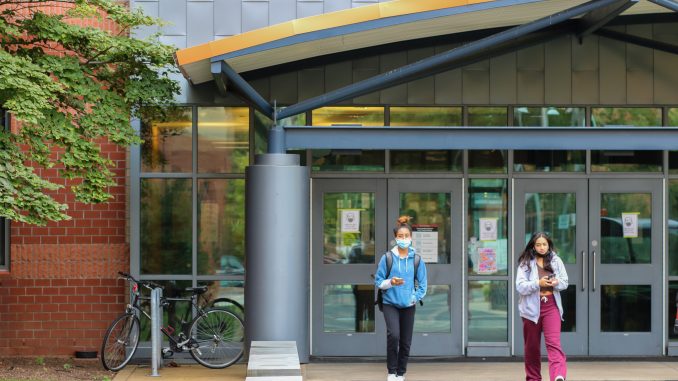
Vents at Temple University’s 1300 Residence Hall had buildup of dust and debris mainly affecting the first, second and third floors of the residence hall, before University Housing and Residential Life’s maintenance staff cleaned out vents that were reported to them between Sept. 13 and Sept. 20.
Currently, UHRL is contracting Chute Master International, a professional building maintenance company, to do an additional widespread cleanout of the hall’s HVAC system, wrote Olan Garrett, director of residential life, in an email to The Temple News. Since they began on Sept. 27, the cleaning company has completed the first floor and the second floor of 1300, and began the third floor yesterday, he wrote.
Chute Master plans to complete work on all five floors of 1300 by the end of October, Garrett wrote.
The dust and debris primarily affected the exhaust vents, which are located in the bathrooms at 1300 and circulate air out of the bathroom, because they are not cleaned out regularly, Garrett said.
“Unfortunately, we’ve had a history of neglecting this particular amount of work and that’s on us,” Garrett said.
Jon Brighton, director of maintenance operations, has been working to implement a routine cleaning schedule in all the residence halls, Garrett said.
UHRL’s maintenance staff started receiving work orders for vents in certain rooms in 1300 on Sept. 13 and cleaned about 15 to 20 vents rooms that week, but became aware that it was more of a widespread problem when they started receiving messages from parents after issues with the vents were discussed in parent Facebook groups, Garrett said.
The maintenance staff had already been collaborating with the university’s Environmental Health & Radiation Safety unit and discovered that the substance in the exhaust vents was dust and debris and not mold, Garrett said.
From Sept. 13 to Sept. 20, UHRL received 24 maintenance requests for the vents and Garrett sent an email to students on Sept. 20 notifying them of the issues with the vents and that all vents reported to maintenance by the end of the day on Sept. 20 would be cleaned out, he said.
Natalie White, a freshman social work major who lives on the second floor of 1300, submitted a maintenance request after seeing dark spots on the vents in the bathroom, she said.
The maintenance staff came to White’s room, removed and cleaned the vents in her bathroom and determined there was no mold present, White said.
The vents at 1300 are not cleaned before the start of each academic year and would not have been cleaned until winter break if the current buildup of dust and debris in the exhaust vents did not occur, Garrett said.
“We’re already there for a few months before Christmas break,” White said. “Why wait when it could be something more serious?”
While the vents have not been regularly cleaned out, air filters at 1300 are changed every year at the recommendation of the EHRS, Garrett said.
The HVAC systems in 1300 are individual units meaning that the buildup of dust and debris did not necessarily affect all units, according to an email sent to students at 1300.
Some students reported feeling sick before the vents were cleaned out, but no correlation between student sickness and the exhaust vents can be confirmed until Student Health Services evaluates the students, Garrett said.
“I got a sore throat, my friend also went home, she got a sore throat, but it was more so just like a scratchy throat and some stuffy sinuses,” said Darian Diaz, a freshman music technology major, who lives on the first floor of 1300.
UHRL began working with Student Health Services at the end of September to evaluate students at 1300 to see if there is any correlation between the vents and students’ symptoms, Garrett said.
There haven’t been any recent updates regarding these efforts, Garrett wrote on Oct. 6.
There are five floors of suite and apartment-style rooms at 1300, making up 85 total units within the building, according to the UHRL website.
Moving forward, UHRL will service 1300 and other campus residence halls in a multi-year vent cleaning service contract, Brighton wrote in an email to The Temple News.
Preventative maintenance at 1300 were particularly difficult as of late due to navigating how to spend money during the COVID-19 pandemic, Garrett said. The maintenance is an approximately $100,000 project, but Garrett now believes that UHRL is in a better place to implement regular cleanings going forward.
“We are being intentional about putting things like this on a regular preventative maintenance window, and our housing facilities folks are doing a really good job of that,” Garrett said.



Be the first to comment